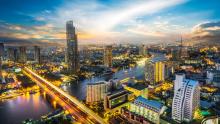In an episode of Changemakers' Conversations, a panel of speakers share their journeys on creating value in sustainability.
In the ‘Science’ section of Impossible Foods’ website is a page with the giant headline: HEME + THE SCIENCE BEHIND IMPOSSIBLE™. The page explains thus:
“Heme is what makes meat taste like meat. It’s an essential molecule found in every living plant and animal -- most abundantly in animals -- and something we’ve been eating and craving since the dawn of humanity.”






